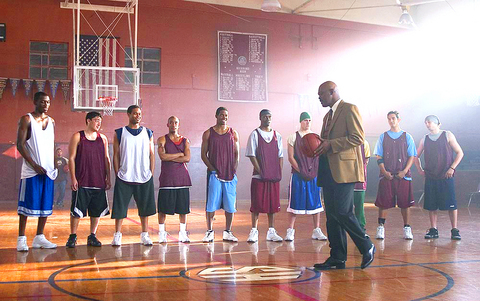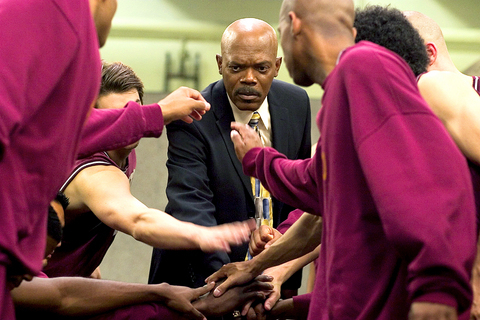As its title suggests, Coach Carter belongs, with recent pictures like Friday Night Lights and Remember the Titans, to that special subcategory of sports movies, the inspirational coach drama. More often than not, movies of this kind are based on -- or, in the more common title-sequence idiom, "inspired by" -- the real lives of men who turn ragged bunches of misfits into champions, or at least contenders, teaching valuable lessons about discipline and teamwork along the way.
Their stories, which march toward the big climactic game, pausing for uplifting speeches and off-the-field crises, are popular with audiences and also with actors. When they can no longer plausibly play professional athletes, male movie stars turn to on-screen coaching, which is rewarding and -- in spite of all the yelling and speechifying -- generally undemanding work. Gene Hackman did it in Hoosiers, as did Denzel Washington in Titans, Billy Bob Thornton in Friday Night Lights, and, to stretch the category a little, Walter Matthau in The Bad News Bears.
And now Samuel L. Jackson joins their clipboard-thumping, my-way-or-the-highway company, playing Ken Carter, real-life coach of a high school basketball team in the tough Northern California city of Richmond. In this solid, unsurprising film, Carter, who was an all-American at Richmond High in the 1970s, has become a successful local businessman, with a sporting-goods store, a midnight-blue sedan and a tidy Craftsman bungalow. He also has a wife (Debbi Morgan), who in coach-movie tradition has a few early lines of dialogue, after which she is relegated to the sidelines, where she bites her lip and pumps her fists at appropriate moments. The coach's son, Damien (Robert Ri'Chard), has a bit more screen time; he's a promising point guard who transfers from a prosperous parochial school -- which is also a perennial basketball powerhouse -- to play for his dad in the run-down Richmond gym.

Coach Carter, directed by Thomas Carter (no relation to the coach) from a screenplay by Mark Schwahn and John Gatins, is both a rousing, by-the-book sports story -- it's amazing how many games are decided by a dramatic shot at the final buzzer -- and a critique of the place of sports in American culture.
The dramatic climax comes not when Richmond wins a big game but when Carter, discovering that his players are faltering in the classroom, locks them out of the gym, an action that makes him a media celebrity and a local pariah. It also turns Coach Carter from a standard inspirational coach drama into an inspirational educator drama, putting Jackson in the company of actors like Morgan Freeman (Lean on Me) and Michelle Pfeiffer (Dangerous Minds).
These movies are not known for originality. Part of their appeal is the sturdy reassurance that their conventions offer, and the plot of Coach Carter provides very few surprises. Carter, a veteran of television whose most recent film was Save the Last Dance, respects the sentimental rules of the genre, but his genuine interest in his young characters -- in basketball, in hip-hop, in the anxious rhythms of teenage male friendship and sexuality -- gives the movie more realism, and more bounce, than it might otherwise have.

PHOTOS COURTESY OF UNIVERSAL
To call Coach Carter's methods old school would be both a cliche and an understatement. Inheriting a multiracial squad of underachievers united in a spirit of hip-hop insolence, he wastes no time in laying down some strict new rules. To play for him, these young men -- or "young sirs," as he calls them, with a hint of sarcasm -- must show up on time to practice, wear neckties on game day and sign a contract promising to maintain a 2.3 grade-point average. The punishment for talking back is several hundred push-ups or "suicides," those grueling cross-court sprints that bring special joy to the hearts of sadistic gym teachers across the land.
Not that Carter enjoys inflicting pain on his players, though the grim smirk that sometimes plays across Jackson's stern features suggests that his character does not exactly share their misery. But it is, of course, for their own good. The educational system, represented by the harried, cynical principal (Denise Dowse) has all but given up on these boys, and the tough love of their coach may offer their only chance of escape from the poverty and despair that surrounds them. The off-court challenges they face are sketched in a series of subplots. Kenyon, a sweet-faced forward played by Rob Brown (Finding Forrester) has impregnated his girlfriend, Kyra (the R 'n' B singer Ashanti, making her film debut), which puts his athletic and academic ambitions in conflict with his impulse to do the right thing. Timo (Rick Gonzalez) is an angry, insecure young man sliding toward a life of gang-banging and drug dealing. Junior (Nana Gbewonyo), the team's center, can barely read a newspaper article chronicling his brilliant exploits on the court.
Jackson acts with his usual steely authority -- his Coach Carter is so convinced of his righteousness that he never needs to be nice -- leaving it to the younger cast members to supply warmth and levity as they absorb his stern lessons. Gonzalez and Brown are especially strong, and Antwon Tanner, playing the team's designated joker, Worm, cuts the solemnity with impish wit. This may be the coach's story, but to the extent that Coach Carter is interesting rather than merely inspirational, it's because of the team.

Aug. 25 to Aug. 31 Although Mr. Lin (林) had been married to his Japanese wife for a decade, their union was never legally recognized — and even their daughter was officially deemed illegitimate. During the first half of Japanese rule in Taiwan, only marriages between Japanese men and Taiwanese women were valid, unless the Taiwanese husband formally joined a Japanese household. In 1920, Lin took his frustrations directly to the Ministry of Home Affairs: “Since Japan took possession of Taiwan, we have obeyed the government’s directives and committed ourselves to breaking old Qing-era customs. Yet ... our marriages remain unrecognized,

During the Metal Ages, prior to the arrival of the Dutch and Chinese, a great shift took place in indigenous material culture. Glass and agate beads, introduced after 400BC, completely replaced Taiwanese nephrite (jade) as the ornamental materials of choice, anthropologist Liu Jiun-Yu (劉俊昱) of the University of Washington wrote in a 2023 article. He added of the island’s modern indigenous peoples: “They are the descendants of prehistoric Formosans but have no nephrite-using cultures.” Moderns squint at that dynamic era of trade and cultural change through the mutually supporting lenses of later settler-colonialism and imperial power, which treated the indigenous as

An attempt to promote friendship between Japan and countries in Africa has transformed into a xenophobic row about migration after inaccurate media reports suggested the scheme would lead to a “flood of immigrants.” The controversy erupted after the Japan International Cooperation Agency, or JICA, said this month it had designated four Japanese cities as “Africa hometowns” for partner countries in Africa: Mozambique, Nigeria, Ghana and Tanzania. The program, announced at the end of an international conference on African development in Yokohama, will involve personnel exchanges and events to foster closer ties between the four regional Japanese cities — Imabari, Kisarazu, Sanjo and

By 1971, heroin and opium use among US troops fighting in Vietnam had reached epidemic proportions, with 42 percent of American servicemen saying they’d tried opioids at least once and around 20 percent claiming some level of addiction, according to the US Department of Defense. Though heroin use by US troops has been little discussed in the context of Taiwan, these and other drugs — produced in part by rogue Chinese Nationalist Party (KMT) armies then in Thailand and Myanmar — also spread to US military bases on the island, where soldiers were often stoned or high. American military policeman